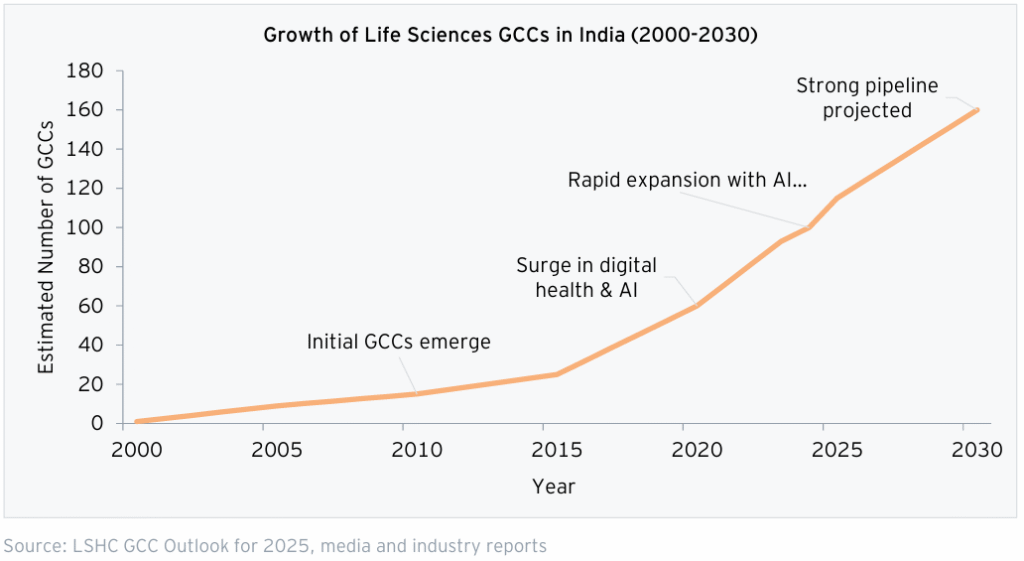
EY recently published its thought leadership paper, Reimagining Life Sciences Global Capability Centers, which explores how GCCs are reshaping the global healthcare landscape. The report highlights a profound shift underway: GCCs, once perceived as cost-efficient back offices, are now central to driving innovation, patient-centricity, and resilience. India, which hosts nearly 60% of the global life sciences GCCs, stands at the heart of this transformation.

This piece unpacks two of the most forward-looking sections of the report — the evolving role of GCCs and the future outlook for next-gen GCCs.
The Evolving Role of GCCs
Over the last decade, GCCs have transformed from transactional hubs into strategic engines of value creation. Their scope now cuts across scientific, digital, and regulatory domains.
-
From cost centers to innovation hubs
Life sciences GCCs are increasingly co-owning innovation. They are advancing drug discovery, experimenting with digital therapeutics, and leveraging real-world evidence analytics to accelerate the development of patient-centric solutions. -
Owning the value chain
Beyond enabling functions like HR and IT, GCCs now manage end-to-end processes such as clinical trial operations, pharmacovigilance, biostatistics, and supply chain analytics. This integrated ownership is accelerating speed-to-market and enhancing compliance. -
Patient-focused outcomes
With patients demanding personalized care, GCCs are running digital health programs and validation frameworks for medical devices. For example, Alcon has created a vertical dedicated to real-world evidence in digital health. -
Enterprise transformation
GCCs are no longer “support arms” but transformation partners. They are embedded in R&D, regulatory affairs, and commercial operations, enabling enterprise agility and global competitiveness.
Harsha Arora, Head of India GES at Merck KGaA, explains: “By delivering quality, we earned the right to play in core fields, and now by partnering for business outcomes, we eventually earned the right to innovate.”
Unlocking Value from Next-Gen GCCs
Looking ahead, GCCs will evolve into strategic partners that shape the future of life sciences. The EY report identifies three imperatives for next-gen GCCs:
-
Driving innovation at scale
GCCs will move beyond execution to co-owning innovation in drug development, digital platforms, and patient engagement. By embedding themselves in R&D and transformation agendas, they will become catalysts for breakthroughs. -
Future-proofing talent
Talent will define the success of next-gen GCCs. Organizations must invest in cross-skilling across GenAI, bioinformatics, and digital health, building agile teams that can solve complex, multidisciplinary problems. Gorky Chugh of Terumo India observes: “We are not just competing with other GCCs, but also with the service companies of the world.” -
Building resilience across the value chain
The GCC model of tomorrow will emphasize complementing — not duplicating — headquarters capabilities. This approach will build resilience across geographies, shifting GCCs from transactional delivery to platform-based ecosystems that generate enterprise-wide outcomes.
As Vineet Dwivedi, Global Head at Alcon Global Services, notes: “Finding a seat at the table is one aspect, while finding a voice at the table is another.” Next-gen GCCs will not only participate in strategic decisions but also actively influence them.
The EY report makes one fact clear: life sciences GCCs are entering a new era. No longer enablers at the margins, they are becoming innovators at the core. By driving enterprise-wide innovation, investing in future-ready talent, and building resilience, GCCs in India are poised to become the nerve centers of global healthcare transformation.
For industry leaders, the message is unmistakable: the organizations that leverage their GCCs as strategic partners will not just keep pace with change — they will help shape the future of health and medicine.




